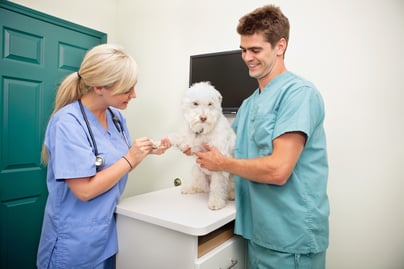We all know them well. If you have worked in a veterinary clinic for even a short amount of time you may have had to deal with some grumpy clients. Here are a few tips to make it easier to deal with clients to keep things running smoothly!
 Remember that the most common cause of clients being upset is a miscommunication. Mix that with emotions, a sick pet, and money and there is bound to be a grouchy client somewhere.
Remember that the most common cause of clients being upset is a miscommunication. Mix that with emotions, a sick pet, and money and there is bound to be a grouchy client somewhere.
1) Always acknowledge the client’s reason for being in the clinic. Specifically, identify the exact concern that the client has when bringing their pet in. “Mrs. Jones, I see that Fluffy is here today for vomiting and lack of appetite?” Let them tell you the history and ask questions when needed. Repeat back to them for clarification as needed so they know they are being heard.
2) Always offer empathy and let the client know you are going to do whatever you can to take care of their pet. Clients also appreciate you acknowledging them. “Mrs. Jones, I am sorry to hear that Fluffy is not feeling well. You must be exhausted from being up all night taking care of her! We will take good care of her today. Let me go get the doctor so he/she can talk to you and examine Fluffy to see what is going on.”
3) After the doctor talks to the client and performs an exam, provide an estimate for services. It is easy to become lax on this, especially for long-standing clients. However, it is good practice to call it a “treatment plan” instead of an estimate. We don’t want to focus on the money aspect, but it is important for them to know what to expect. This shows exactly what treatments “Fluffy” will be getting, but also shows the cost so there are no surprises. Having a signed estimate is them giving their permission for your hospital to perform those treatments as well as them agreeing to the costs involved. It is good to explain the treatments. We forget sometimes that the client likely has no medical background. If you say to the client, "We are going to do a CBC and chemistry panel," that may sound like a foreign language to them. Instead say, "We are going to do a blood test that will provide us information about Fluffy's blood cells and organ function."
4) Schedule follow-up calls to check on patients the day after their visit (especially sick patients). Clients like to know that you care about their pet and want to make sure they are improving. It also allows a chance for them to ask any questions they may be having after reflecting upon their visit.
5) If a client becomes irrational or angry and a situation is escalating, it is best to excuse yourself from the room politely. Say, “I can see that you are upset. I am going to step out of the room for a moment and will get the doctor for you. Can I get you some water or anything while you are waiting?” Being polite and staying calm can help the client to calm down as well.
6) As a veterinary technician, try to be as helpful as you can to the client. But if a client is having concerns about treatments, payments, or their pet’s illness, these issues should be addressed directly by the veterinarian. Never provide diagnosis or suggestions to a client for what you think is wrong or what should be done without speaking to the veterinarian first.
7) Lastly, don't take it personal! When clients get upset it can be very stressful. Take a deep breath, do the best you can, and let it go.

